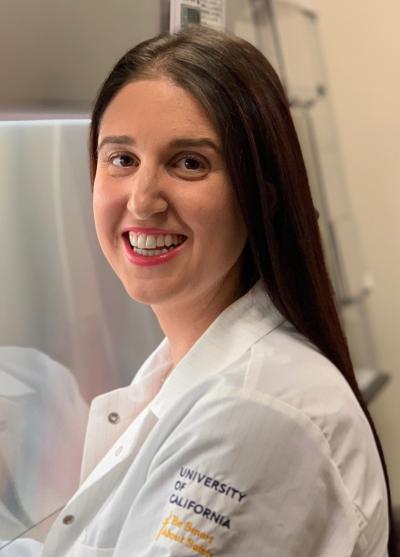
Credit: UC Riverside
RIVERSIDE, Calif. – Rebekah Charney, a postdoctoral researcher in the School of Medicine at the University of California, Riverside, has been awarded the prestigious Ruth L. Kirschstein National Research Service Award Individual Postdoctoral Fellowship by the National Institute of Dental and Craniofacial Research of the National Institutes of Health.
The fellowship provides $177,000 to support Charney for three years to study the earliest events underlying the formation of neural crest cells.
Charney, who joined UCR in 2016 after receiving her doctoral degree at UC Irvine, explained that neural crest cells are a stem cell population unique to vertebrates. They migrate extensively throughout the developing embryo and form numerous derivatives, including neurons, pigment cells, and most of the bone and connective tissue in the face. Their improper development leads to multiple pathologies, including very common birth defects such as cleft lip and cleft palate and aggressive cancers such as neuroblastoma. However, major questions regarding the formation of neural crest cells remain unanswered.
“The molecular mechanisms underlying the earliest stages of neural crest cell formation remain uncharacterized, and this fellowship precisely aims to address this issue,” Charney said.
At UCR, Charney works in the laboratory of Martín I. García-Castro, an associate professor of biomedical sciences. Under the fellowship, Charney will be sponsored by Garcia-Castro and co-sponsored by Nicole zur Nieden, an associate professor in the Department of Molecular, Cell and Systems Biology. On the research project, Charney will also collaborate with Thomas Girke, an associate professor of bioinformatics at UCR.
“The research enabled by this fellowship brings together multiple research groups from across the UCR campus,” Charney said. “Together, we will integrate cutting-edge, genome-wide technology with embryology and stem cell biology in order to uncover the processes underlying key developmental decisions.”
García-Castro, her sponsor, emphasized that this is the first instance this fellowship has been awarded to a postdoctoral researcher performing work in the School of Medicine since accreditation. “Dr. Charney is an outstanding postdoctoral scholar who joined the Division of Biomedical Sciences with a glowing academic record,” he said. “Since her arrival, Rebekah has made great strides in her research implementing creative approaches to decipher the molecular interactions that initiate the formation of the neural crest, and has been very successful in crafting research funding applications and getting our research published.
“She is a smart, tenacious and tireless scientist who has already been recognized for her capacity and promise to lead a very productive research career in academia,” he continued. “At the same time, she has distinguished herself through service towards other members of the School of Medicine and UCR community, including envisioning and initiating workshops for postdoctoral scholars, and mentoring undergrads. I am thrilled to have her performing her postdoctoral work with us, and look forward to her continued positive impact on the UCR and scientific community.”
Charney’s work under this fellowship pioneers gene network studies of neural crest cell specification at previously uncharacterized early stages of development. Neural crest cells are thought to arise from committed ectoderm cells – one of the three germ layers that serve as the foundation for the tissues and organs that make up the adult body – in a region of the embryo called the neural plate border. Evidence from the García-Castro laboratory and others, however, suggest a much earlier origin of neural crest cells that is prior to the committed segregation of the germ layers.
“The goal of this work is to investigate how transcription factors function in regulating the earliest stages of neural crest formation,” Charney said. “Using CRISPR/Cas9 genome editing technology, select genes will be removed from human embryonic stem cells, and I will assess the effect of their loss on the formation of human neural crest cells. The role of these factors will also be tested in animal models of development, for example in the chick embryo.”
Charney noted that the immediate outcomes of the research are addressing key biological questions of neural crest formation and processes governing cell fate decisions during development. Understanding how neural crest cells are formed, and how this process is disrupted in a disease state, however, can help lead to novel therapeutics. Such projects are already underway in the García-Castro lab.
###
Charney is the recipient of several other awards and honors, including a K. Patricia Cross Future Leaders Award from the Association of American Colleges and Universities. At UCI, she was a recipient of a U.S. Department of Education Graduate Assistance in Areas of National Need fellowship, an Edward Steinhaus Teaching Award, and was an NSF IGERT LifeChips trainee.
Media Contact
Iqbal Pittalwala
[email protected]
951-827-6050




